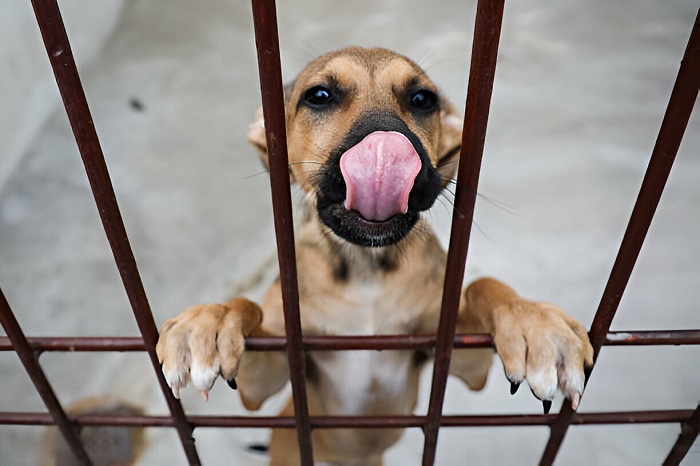Last Updated on February 28, 2025
Xanthan gum is generally safe for dogs in small amounts. Large quantities might cause digestive issues.
Xanthan gum is a common additive in many processed foods. It’s used as a thickener and stabilizer in dog foods and treats. Pet owners often worry about the safety of their dogs. Understanding the effects of xanthan gum can help make informed dietary choices.
While small amounts are typically safe, large quantities can lead to digestive problems. Symptoms may include gas, bloating, and diarrhea. Always check ingredient lists and consult your veterinarian for advice. Keeping your dog’s diet balanced and healthy is essential for their overall well-being.
Xanthan Gum In Dog Food

Xanthan gum is a common ingredient in many dog foods. It’s a thickening agent that helps improve the texture of food. But is it safe for dogs? Let’s explore its uses and benefits.
Common Uses
Xanthan gum is often used in dog food for various reasons:
- Thickens gravy and sauces in wet dog food.
- Improves the texture of kibble.
- Helps maintain the shape of treats.
- Acts as a stabilizer in various dog food products.
These uses make xanthan gum a popular choice among dog food manufacturers.
Potential Benefits
Xanthan gum may offer some benefits for dogs, including:
- Improved Digestion: Some studies suggest it aids digestion.
- Better Texture: Enhances the texture of food, making it more palatable.
- Consistent Quality: Helps maintain a consistent quality in food products.
These potential benefits make xanthan gum a useful ingredient in dog food. It’s important to consider both the uses and benefits of xanthan gum.
| Uses | Benefits |
|---|---|
| Thickens sauces | Improves digestion |
| Improves kibble texture | Enhances food texture |
| Maintains treat shape | Consistent quality |
Understanding xanthan gum’s uses and benefits helps determine its role in dog food.
Health Impacts On Dogs
Xanthan gum is a common food additive. It thickens and stabilizes food. But is xanthan gum bad for dogs? Let’s explore its health impacts on dogs. Understanding how it affects dogs can help you make informed decisions.
Digestive Reactions
Xanthan gum can cause digestive issues in dogs. It may lead to diarrhea or bloating. Dogs with sensitive stomachs are more at risk. Always watch for signs of discomfort after eating food with xanthan gum.
- Diarrhea
- Bloating
- Gas
Allergic Responses
Some dogs may have allergic reactions to xanthan gum. Signs of allergies include itching, swelling, and redness. Watch your dog closely if they eat something with xanthan gum. If you see these signs, contact your vet.
| Symptom | Details |
|---|---|
| Itching | Dog may scratch excessively |
| Swelling | Face or paws may swell |
| Redness | Skin may appear red and inflamed |
Toxicity Levels
Xanthan gum is generally not toxic to dogs. But large amounts can cause problems. Always check the ingredient list of your dog’s food. Keep an eye on the amount of xanthan gum.
- Check ingredient lists
- Monitor your dog’s reactions
- Consult your vet if unsure
Safe Feeding Practices
Understanding safe feeding practices for dogs is crucial. Xanthan gum is a common additive in pet food. It is important to know the right amount for dogs. This section guides you on safe feeding practices.
Recommended Dosages
Dogs can eat xanthan gum in small amounts. The recommended dosage depends on the dog’s weight and size. Below is a table to help you:
| Dog’s Weight | Recommended Dosage |
|---|---|
| 0-10 lbs | 0.1-0.3 grams |
| 10-25 lbs | 0.3-0.6 grams |
| 25-50 lbs | 0.6-1.0 grams |
| 50+ lbs | 1.0-1.5 grams |
Always measure the dosage carefully. Too much xanthan gum can upset your dog’s stomach.
Alternative Thickeners
If you prefer not to use xanthan gum, there are alternative thickeners available. Consider these options:
- Agar-Agar
- Guar Gum
- Arrowroot Powder
- Chia Seeds
These alternatives can be safer and just as effective. Choose what best suits your dog’s diet.
Consulting Veterinarians
Always consult veterinarians before adding new ingredients to your dog’s diet. They can provide personalized advice based on your dog’s health. Schedule regular check-ups to ensure your dog stays healthy.
Your vet can also help you monitor any adverse reactions. This way, you can make informed decisions about your dog’s nutrition.

Frequently Asked Questions
How Toxic Is Xanthan Gum To Dogs?
Xanthan gum is generally safe for dogs in small amounts. Large quantities may cause digestive issues like gas and diarrhea. Always consult your vet.
Why Should You Avoid Xanthan Gum?
Xanthan gum can cause digestive issues like bloating and gas. Some people may have allergic reactions. It’s a highly processed additive. Avoiding it can lead to cleaner eating and fewer health risks.
What Ingredients In Gum Are Toxic To Dogs?
Xylitol is toxic to dogs and found in many sugar-free gums. It can cause hypoglycemia and liver failure. Always check the ingredients.
Is Xanthan Gum A Toxin?
Xanthan gum is not a toxin. It’s a common food additive used for thickening and stabilizing. Generally recognized as safe by the FDA.
Is Xanthan Gum Toxic To Dogs?
Xanthan gum in small amounts is generally safe for dogs. Large quantities, however, can cause digestive issues.
Conclusion
Xanthan gum is generally safe for dogs in small amounts. Always consult your vet before introducing new ingredients. Monitor your dog for any adverse reactions. Your pet’s health should always come first. Understanding what goes into their food can help keep them happy and healthy.




